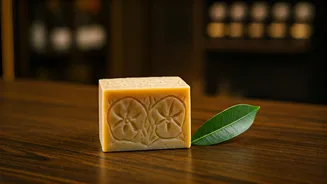Ghee's Nutritional Profile
Ghee, a form of clarified butter, holds a prominent position in Indian culinary traditions. The process of making ghee involves heating butter until the
milk solids separate, resulting in a pure fat that's rich in flavor and has a high smoke point. While it’s a good source of fat-soluble vitamins like A, D, E, and K, it's also a concentrated source of calories. This high caloric density means that while it provides essential nutrients, consuming too much can lead to weight gain. Moreover, ghee is composed of saturated fats, and moderation is key to maintaining cardiovascular health. It's important to consider ghee as a part of overall dietary patterns to realize its nutritional benefits while also managing its potential impacts.
The Calorie Consideration
One of the fundamental aspects to remember with ghee is its high caloric density. As ghee is essentially pure fat, it provides around 120 calories per tablespoon, a significant amount. This means even small servings can contribute a lot to your daily calorie intake. For individuals managing their weight or calorie intake, it’s necessary to be mindful of the quantity of ghee they consume. Incorporating ghee into a balanced diet means understanding this calorie content and adjusting your overall intake to avoid excess. While ghee provides essential vitamins and a rich flavor profile, its calorie content must be considered alongside your daily nutritional goals.
Science and Ghee's Health
Science gives a mixed perspective on ghee's health benefits. Ghee is free from lactose and casein, making it a viable option for people with lactose intolerance or dairy sensitivities. It’s also known for its potential to improve digestion and strengthen the immune system because of its fat-soluble vitamins. However, the high saturated fat content of ghee raises some health concerns. Excessive intake of saturated fats has been associated with elevated LDL (bad) cholesterol levels, which can increase the risk of heart disease. Research suggests that while ghee can be part of a healthy diet, it needs to be consumed in moderation, and should be part of an overall balanced diet that emphasizes fruits, vegetables, and lean proteins.
Expert Advice on Ghee
Nutritionists like Dr. Siddhant Bhargava frequently emphasize the need to balance traditional dietary choices with modern nutritional knowledge. Dr. Bhargava and other experts underscore that, although ghee offers certain health benefits, overconsumption can be detrimental. They recommend incorporating ghee in moderation, using it as a part of a wider, well-balanced diet plan. Portion control is often a key recommendation, as is the need to combine ghee with other nutrient-rich foods. Such advice underlines that ghee can be a valuable addition to your diet when consumed properly, considering its effects on your overall health and wellness. Always consult a healthcare professional or a registered dietitian for personalized dietary advice.
Beyond Weight Management
The impact of excessive ghee consumption goes beyond weight issues. A diet too high in saturated fats can negatively affect the levels of cholesterol in the blood, increasing the risk of cardiovascular problems. This is because high intake can lead to a rise in LDL cholesterol, which can accumulate in arteries and lead to blockages. Furthermore, unbalanced diets with high amounts of fat could indirectly affect the overall metabolism of the body, creating possible issues with insulin resistance and the function of other metabolic processes. It’s critical to remember that while ghee has unique nutritional advantages, maintaining overall well-being calls for mindful portion control and a balanced dietary approach.













